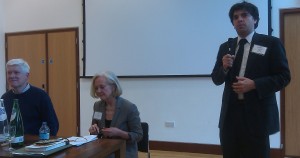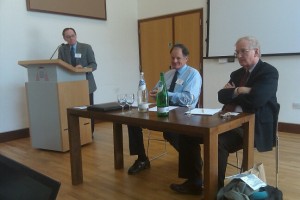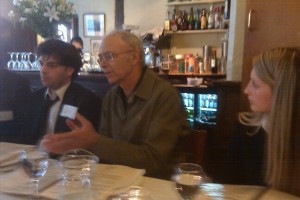There is much more to say about this past week’s amazing events at Oxford than I can fit into this blog post, and I will try to do so in a more systematic way once I’ve had some more time to think about everything. For now, let me just share some thoughts along with a a few pictures.
Here are two shots from where John Perry took me to ‘high table’ dinner at Christ Church College on Tuesday night. For those of us who have never been there before, and only seen this room in the movies, it was an amazing experience…especially given that so interesting people were sitting around the table. It certainly ‘set the scene’ for the special event that was about to unfold:
The next day, John organized a manuscript colloquium for me, and I got a ton of helpful feedback from his graduate students and various faculty that attended. Rob Vischer, of Mirror of Justice fame, happened to be at Oxford for the month, came to the colloquium, and (after asking me some good, hard questions) blogged about it soon after. I have some serious revisions to do, but I’m so glad for the feedback from everyone there…and to John for setting it up.
On Thursday the conference began. John Perry did a great job planning and executing every aspect of it. Here is he wrapping up the session with Lisa Cahill and John Haldane:
Of particular interest was the huge contribution made by John Hare, the son of Singer’s mentor at Oxford, R.M. Hare. His important work presses utilitarians on how they are to jump ‘the Moral Gap’ without traditional Christian understandings of grace, providence, forgiveness, and happiness. Here is John Hare at his session with the utilitarian philosopher Brad Hooker, moderated by Robin Lovin:
Thursday night Singer graciously had a long dinner at a local Thai restaurant with a bunch of Christian ethicists looking to press the very tired atheist utilitarian even further. Here he is flanked by conference organizer John Perry and Fordham graduate student Sigourney Giblin:
On Friday we finished with two sessions: one on global poverty and then a 90 minute round-table with audience question and answer. It was the perfect way to end the conference. At the end, Singer himself admitted that he saw important common ground with Christianity on non-human animals, global poverty, and ecological/climate issues.
These are important practical issues on which both approaches to ethics need to work (in some measure) together, but from a theoretical point of view perhaps the most interesting insight that seemed to come from the two days was that Christians and utilitarians, while having important differences, are not mortal enemies…and certainly not polar opposites. To the extent that Christianity is teleological, it already has a consequentialist ethics…with important qualifiers about what kinds of acts can and cannot be offered to God, of course. Furthermore, the internal debate that Singer and other utilitarians are having about whether to consider ‘objective goods’ when doing moral calculations (pushed impressively by the utilitarian philosopher Tim Mulgan) is something that was highlighted to good effect by Christians throughout the conference. ‘Objective goods’ is something we do very well!
Like I said, more later. But wanted to get a few thoughts and images out there.










Charlie, it looks like it was a great conference, and I look forward to hearing what further comes out of the conversations you had in Oxford. I admire the willingness to engage people from a range of philosophical and theological perspectives and to seek common ground where possible. But I was thinking about Philippa Foot’s line that “no decision is more important for practical ethics than that by which we come to embrace or reject utilitarianism.” I’m puzzled, then, by a couple of things in your claim, “To the extent that Christianity is teleological, it already has a consequentialist ethics…with important qualifiers about what kinds of acts can and cannot be offered to God, of course.”
1. The “to the extent” phrase suggests an identity or correlation between teleological views and consequentialist views, but surely there are views generally categorized as teleological (Aristotle’s, for one) that are not consequentialist–unless we’re working here with a very peculiar definition of either “teleological” or “consequentialist.”
2. You say that Christian ethics has “qualifiers about what kinds of acts can and cannot be offered to God,” but aren’t those “qualifiers” precisely what consequentialism is committed to denying (not so much the part about acts “offered to God,” but the claim that there are “kinds of acts” that are forbidden, regardless of the consequences)?
Hey Mike…good to hear from you. Well, with respect to Philippa Foot, I think one that that came out of this conference is that her polarized attitude toward utilitarianism, at least from a Christian perspective, is highly questionable. On many, many issues Christians seem far closer to utilitarians than to say, good-old-fashioned hyper-autonomist, consumerist, Enlightenment liberals.
In addition, I think it is a mistake it to simply identify consequentialist ethics with utilitarian ethics. Surely utilitarianism is one kind of consequentialism…but so is teleology. (Especially a teleology that sees its end goal as union with God.) Heck, so is egoism. One of the interesting things that same out of Tim Mulgan’s presentation (which I suggest you watch: http://mcdonaldcentre.org.uk/resources/peter-singer-conference/) is that he is consequentialist who is not a utilitarian…because he believes in promoting multiple objective goods which cannot conform to a single principle of utility. So, no, there is nothing about consquentialism which in principle rules out exceptionless moral norms.
Charlie, I think I’m still confused about what you mean when you say that “utilitarianism is one kind of consequentialism…but so is teleology,” because I would have thought the terms should be switched around, i.e., that consequentialism is one (but not the only) kind of teleological view in ethics. I *think* it means you’re committed to a definition of “consequentialism” that is much broader than what we ordinarily mean by the term. On your view, was Aristotle a consequentialist because he has a teleological view (that human action is for an end)? I know there can be pluralistic (as to the good) consequentialists, and I know Tim has a commitment to some objective goods and so takes a non-utilitarian but still overall consequentialist view, and so on. (By the way, I’m not sure that taking account of “objective goods” within an overall consequentialist view would be the same as holding “exceptionless moral norms.”) But my major concern here is to preserve the point that there can be teleological (particularly ancient eudaimonistic) accounts in ethics that are non-consequentialist.
I’m also a huge fan of Philippa Foot’s and so will rush to defend her memory. She certainly wasn’t a “hyper-autonomist, consumerist, Enlightenment liberal[],” but I don’t take you to be lumping her into that unwelcome category. I’ve never thought Foot had a “polarized attitude” toward utilitarianism, unless by that we mean that she (and Bernard Williams, and John Rawls) made a lot of powerful arguments against it, which is what moral philosophers do. Her essays on it—especially “Utilitarianism and the Virtues”—strike me as working very hard to get to the heart of a set of difficult questions, even if utilitarians don’t like her conclusions. And her point in that essay that the problem with utilitarianism is its consequentialism (morality as bringing about a “good” or “better” or “best” state of affairs) is why I’m still trying to get clear about our terms.
Mike, you’re right, I’m using ‘consequentialist’ in a broader sense than some use it…but I think it is a much more helpful and precise way of imagining these kinds of moral categories. Teleology is by definition an understanding of the moral life as achieving an inherent ‘telos’ or ‘end’ of persons (and, for Christians, the whole created order)…and it is therefore a kind of consequentialism–albeit not a kind of utilitarianism (despite the fact that both approaches may and do have significant overlap). By contrast, not every kind of consequentialism is teleological. Singer’s consequentialism (for now, anyway) rejects the notion of any sort of telos or end for persons (and certainly for the ecological world).
Oh, gosh, I didn’t mean to imply that Foot was in that category…I’m sorry if it came across that way! But when she says “no decision is more important for practical ethics than that by which we come to embrace or reject utilitarianism” that seems to be an unhelpful way of polarizing the relationship between Christian ethics and utilitarianism…especially when, as the Oxford conference showed, we have so much we have in common on so many important issues.
Charlie, I think you’re underestimating the extent to which your usage of consequentialism differs from the standard uses of the term. While it’s true to say that there isn’t a single agreed upon definition of consequentialism, I’m not familiar with any precedent in recent ethical theory for using the term expansively enough to include the kind of eudaimonistic and teleological ethics that you find in Aristotle. Now it’s not necessarily an objection to say that a term is being used in a non-standard way, but it does put pressure on you to give a clear definition of the way you’re using the term and explain why is is more helpful to define the term that expansively. Notice you haven’t provided a definition, you’ve just said that certain views count as consequentialist on account of some feature of those views (different features in each case) and left the reader to infer the general rule about how the term is to be used. And having gone to some lengths to emphasize the internal heterogeneity of the category as you’ve defined it, it would surely be helpful to explain why it’s illuminating to group such heterogeneous ethical theories together.
“Teleology is by definition an understanding of the moral life as achieving an inherent ‘telos’ or ‘end’ of persons (and, for Christians, the whole created order)…and it is therefore a kind of consequentialism.”
I would have drawn the opposite conclusion. In so far as Aristotelianism grounds ethics on the achievement of the agent’s telos, it cannot be a form of consequentialism because on such a view ethics isn’t a matter of bringing about the best consequences from an agent-neutral perspective.
“[Mulgan] is consequentialist who is not a utilitarian…because he believes in promoting multiple objective goods which cannot conform to a single principle of utility. So, no, there is nothing about consquentialism which in principle rules out exceptionless moral norms.”
It doesn’t follow from the fact that a view allows multiple objective goods that it can allow exceptionless moral norms (I’m not saying that you couldn’t have a view that had both features, only that the former feature isn’t what makes possible the latter). One could hold that there are multiple objective goods while also holding that there are no types of actions which are always morally wrong. The view could be analogous to Ross’ intuitionism which held that there were multiple categories of duty which were neither hierarchically arranged nor reducible to any more basic duties, but none represented an exceptionless moral norm because it is always an open possibility that in some particular circumstance any particular duty would be overridden by one or more of the others. Anscombe classified Ross as a consequentialist precisely because it *didn’t* allow for exceptionless moral rules.
The language of exceptionless moral norms should probably be made more precise as well. After all classical act utilitarianism has an exceptionless moral norm: We should always act so as to bring about the greatest good. But surely such a rule isn’t a moral absolute in the normal sense of the term.
Good stuff, as usual, Peter. As you might imagine, I’m not sure I can give the full argument in the comments section of a blog post…and when you read the final chapter of the manuscript you’ll get the current version of the argument (though I think it is likely to change somewhat after the Oxford conference). At any rate, here a nice quote from MacIntyre that shows that this general angle is not simply my own:
“How then should we formulate the Thomistic and Aristotelian claim that I am advancing? Thomistic Aristoalians agree with utilitarians that moral rules have to be understood teleologically. They agree with Mill—or rather Mill agreed with them—that there is no inconsistency in asserting of certain kinds of action both that they should be done for their own sake and also for the sake of achieving some further end.” (Intractable Moral Disputes, 50)
I’m not sure why consequentialism should necessarily entail, as you say, ‘bringing about the best consequences from an agent-neutral perspective.’ Indeed, I’m not sure that Mulgan’s self-described consquentialism (which he describes as ‘promoting value’ in question and answer) would fit into this category. I guess in the simplest terms I see consequentialism as an understanding of the moral life that doesn’t fit into deontological or liberal/contractualist categories. Lisa Cahill makes a similar kind of move here:
http://www.ts.mu.edu/content/42/42.4/42.4.4.pdf
Oh, the conclusion about exceptionless moral norms wasn’t mean to follow directly from the point about Mulgan…but from the more general point I was making about consequentialism not being identical with utilitarianism. If the goal of the moral life is consequentialist in that it is designed to achieve the common good of all creation proximity, and union with God ultimately (as Thomas appears to say), that is perfectly consistent with some actions never being able to serve these goals, and it is therefore a kind of consequentialism that is perfectly consistent with exceptionless moral norms of the kind that many Christians wish to uphold.
Charlie, I’d find it helpful if you could give an example of a major figure who is *not* a “consequentialist,” in your broad sense of the term, and what it is about his or her view by virtue of which they are excluded from that category. And I’m puzzled by your cite to Lisa’s 1981 Theological Studies article, which I take to be arguing for a clarification and limitation on the scope of “consequentialism” (the definition of which Lisa takes over from Anscombe) so that Richard McCormick and other proportionalist moral theologians could not be accused of it.
Perhaps it will be better for me to wait until I’ve finished reading the manuscript to continue the conversation, but very briefly: it sounds as if the point of connection that you are emphasizing is that secular Aristotelians and Christian natural law theorists agree with consequentialists in taking the good to be prior to the right (so rules of right action are justified and made comprehensible by reference to facts about what is good). And that really is a point on which they differ sharply from a range of influential approaches to ethics that share a common ancestry through Kant and for which the right is prior to the good. Fair enough, although I’m still resistant to making that a sufficient condition for an ethical theory’s counting as consequentialist not only because it seems to me a break from standard usage but also because I think that it threatens to obscure more important differences than it will illuminate important connections.
Peter, thanks. Like I said, I’m going to change some things in that chapter…but I’ll appreciate your critical feedback.
Mike, see Peter’s last post for the answer to your first question. As far your question about Lisa’s article, here she is making a version of the kind of move I want to make:
“In subsequent literature, “utilitarianism” (in the classical sense of “the greatest good for the greatest number”) and “consequentialism” have been taken as synonyms.15 Additionally, utilitarianism has been viewed by many as comprising most if not all teleology, or at least “pure” teleology. I shall argue that this is a misrepresentation of teleology. In addition, it may be possible to define consequentialism more broadly, though whether this is advisable given the genesis and generally accepted meaning of the term remains in question.”
>>”To the extent that Christianity is teleological, it already has a consequentialist ethics.”<<
I guess this is the claim I don't understand.
Sounds like a promising project though!